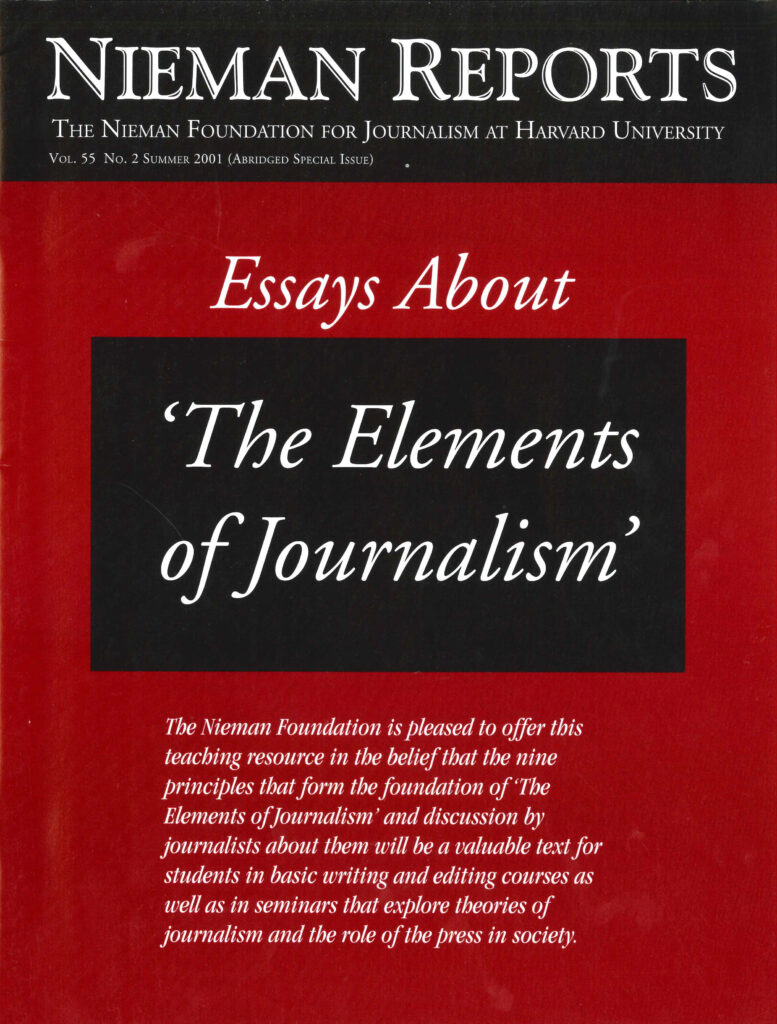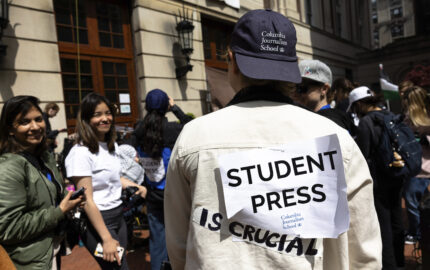
The Elements of Journalism
In “The Elements of Journalism,” Bill Kovach and Tom Rosenstiel describe nine principles of journalism that speak to the essential responsibilities of journalists, the standards informing their work, and the role of a free press in a functioning democracy. Nieman Reports invited U.S. and international journalists to write short reflective essays about how these principles affect their work. Their insightful commentaries are paired with excerpts from the book to create a valuable teaching tool and classroom resource.
How well are journalists doing these days at behaving as what the Hutchins Commission in 1947 called “common carriers of public discussion?” That’s the question Bill Kovach and Tom Rosenstiel examine in their chapter “Journalism as a Public Forum.” Their conclusions are the same ones I derive from my practice and observation of journalism: Many of us have lost our way, and both the media and our democracy are the worse for it.
The spawning of new technologies and ever more numerous channels of information make the media’s potential for creating public forums more robust than ever. But today’s conditions also greatly increase chances that the news will be distorted and manipulated and make it harder than it’s ever been to shape the news responsibly. It seems anyone with a point of view—and plenty of resources—can influence media coverage. This makes it all the more incumbent on us as journalists to act prudently and carefully in choosing and presenting the news. Instead, all too often, we are primary figures in misshaping it.
Take the Clinton-Lewinsky scandal, which began when I was ombudsman at The Washington Post. Certainly it was an important story, but the Post and other news organizations ill-served their public forum responsibilities in the great excess of sometimes prosecutorial, sometimes voyeuristic coverage. The paper and the political process were the worse for it. Indeed, readers’ complaints frequently involved, in one way or another, the paper’s failure to take into account just how much impact it had in deciding where and how to train its spotlight. “Why does your political coverage seem to imply that everyone is always scheming all the time, and no one ever means what they say?” readers asked. When the topic was legislative battles, a familiar complaint was, “Why do I have to follow the story inside to learn what a bill would actually do?” And in a message I remember well, one reader pleaded, “Could you just give me the facts? I can supply the cynicism.”
At a time when voices are raised to such a high pitch in so many media, the demands on serious journalists to keep their wits about them are great. Yet we frequently feed the polarization instead. Think of coverage of gun control, crime and punishment, abortion, drug abuse, the death penalty. The thoughtful middle—the realm where most American public opinion lies—is poorly represented and often just plain ignored. The result is another complaint I heard frequently: We appear to be writing for one another and for others in power—“I don’t recognize myself or anyone I know in your newspaper.”
Our provision of a public forum is essential to the formation of, in these authors’ words, “what James Madison and others considered the basis upon which democracy would stand—compromise, compromise, compromise.” Yet with our “wedge issues R us” stance, we encourage exactly the opposite. Some would say that the proliferation of channels of communication has the potential to make this system self-correcting. We might fail in individual media to be responsible, but with the Web enabling anyone to enter the debate, someone at some point will call us on it.
But Kovach and Rosenstiel hold—correctly, I think—that instead of being liberated we have “become captive to the technology.” I believe cost cutting lies behind many of the issues raised in this chapter, though the authors don’t explicitly link this to their concerns. They observe that the diminished regard for fairness and responsibility leads to situations in which “facts are replaced instead by whatever sells—or can be sold.” And they also cite this powerful quote from Noah Webster: “[N]ewspapers are not only the vehicles of what is called news; they are the common instruments of social intercourse, by which the Citizens of this vast Republic constantly discourse and debate with each other on subjects of public concern.” Yet today we see these “common instruments” are much reduced, having developed a preference for demographics that draw advertising over old allegiances to community and the largest and most diverse possible readership.
Consider, too, the negative effect of cost cutting on what we actually produce. The authors blame “our new media culture” more broadly, but surely money is a piece of why we have “seen the urge to comment replace the need to verify, sometimes even the need to report. The communications revolution is often more about delivering news than gathering it.” As the authors note, “quite literally, talk is cheap,” a fact that explains much of the vitriol to which we, in the media, subject the public.
The sad result is that “the mass media no longer help identify a common set of issues.” Democracy is thus weakened and so, ironically, given how much of this is driven by our quest for commercial success, is the health of our industry.
Geneva Overholser, a 1986 Nieman Fellow, is former ombudsman at The Washington Post. She currently holds an endowed chair at the University of Missouri School of Journalism.
The spawning of new technologies and ever more numerous channels of information make the media’s potential for creating public forums more robust than ever. But today’s conditions also greatly increase chances that the news will be distorted and manipulated and make it harder than it’s ever been to shape the news responsibly. It seems anyone with a point of view—and plenty of resources—can influence media coverage. This makes it all the more incumbent on us as journalists to act prudently and carefully in choosing and presenting the news. Instead, all too often, we are primary figures in misshaping it.
Take the Clinton-Lewinsky scandal, which began when I was ombudsman at The Washington Post. Certainly it was an important story, but the Post and other news organizations ill-served their public forum responsibilities in the great excess of sometimes prosecutorial, sometimes voyeuristic coverage. The paper and the political process were the worse for it. Indeed, readers’ complaints frequently involved, in one way or another, the paper’s failure to take into account just how much impact it had in deciding where and how to train its spotlight. “Why does your political coverage seem to imply that everyone is always scheming all the time, and no one ever means what they say?” readers asked. When the topic was legislative battles, a familiar complaint was, “Why do I have to follow the story inside to learn what a bill would actually do?” And in a message I remember well, one reader pleaded, “Could you just give me the facts? I can supply the cynicism.”
At a time when voices are raised to such a high pitch in so many media, the demands on serious journalists to keep their wits about them are great. Yet we frequently feed the polarization instead. Think of coverage of gun control, crime and punishment, abortion, drug abuse, the death penalty. The thoughtful middle—the realm where most American public opinion lies—is poorly represented and often just plain ignored. The result is another complaint I heard frequently: We appear to be writing for one another and for others in power—“I don’t recognize myself or anyone I know in your newspaper.”
Our provision of a public forum is essential to the formation of, in these authors’ words, “what James Madison and others considered the basis upon which democracy would stand—compromise, compromise, compromise.” Yet with our “wedge issues R us” stance, we encourage exactly the opposite. Some would say that the proliferation of channels of communication has the potential to make this system self-correcting. We might fail in individual media to be responsible, but with the Web enabling anyone to enter the debate, someone at some point will call us on it.
But Kovach and Rosenstiel hold—correctly, I think—that instead of being liberated we have “become captive to the technology.” I believe cost cutting lies behind many of the issues raised in this chapter, though the authors don’t explicitly link this to their concerns. They observe that the diminished regard for fairness and responsibility leads to situations in which “facts are replaced instead by whatever sells—or can be sold.” And they also cite this powerful quote from Noah Webster: “[N]ewspapers are not only the vehicles of what is called news; they are the common instruments of social intercourse, by which the Citizens of this vast Republic constantly discourse and debate with each other on subjects of public concern.” Yet today we see these “common instruments” are much reduced, having developed a preference for demographics that draw advertising over old allegiances to community and the largest and most diverse possible readership.
Consider, too, the negative effect of cost cutting on what we actually produce. The authors blame “our new media culture” more broadly, but surely money is a piece of why we have “seen the urge to comment replace the need to verify, sometimes even the need to report. The communications revolution is often more about delivering news than gathering it.” As the authors note, “quite literally, talk is cheap,” a fact that explains much of the vitriol to which we, in the media, subject the public.
The sad result is that “the mass media no longer help identify a common set of issues.” Democracy is thus weakened and so, ironically, given how much of this is driven by our quest for commercial success, is the health of our industry.
Geneva Overholser, a 1986 Nieman Fellow, is former ombudsman at The Washington Post. She currently holds an endowed chair at the University of Missouri School of Journalism.


